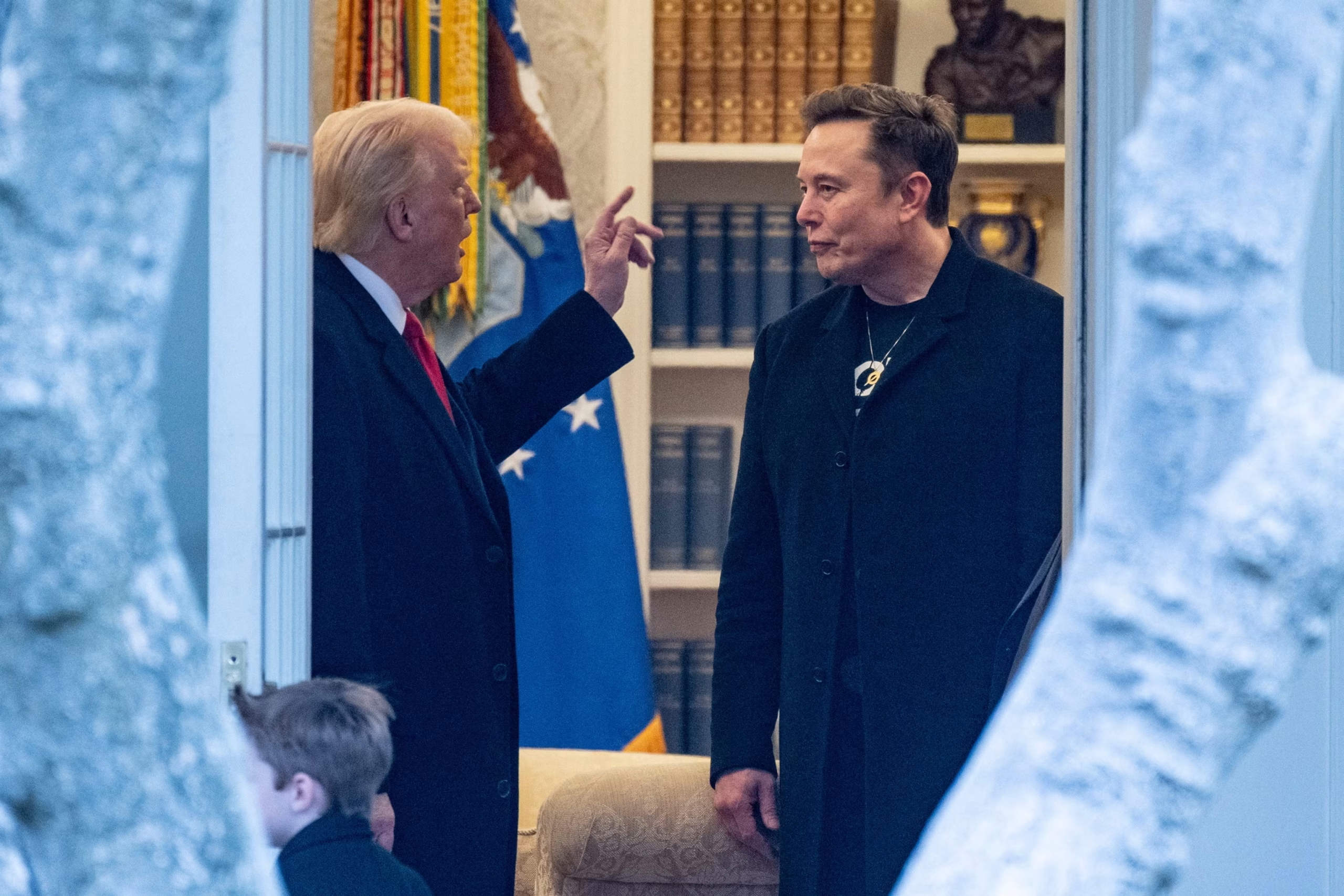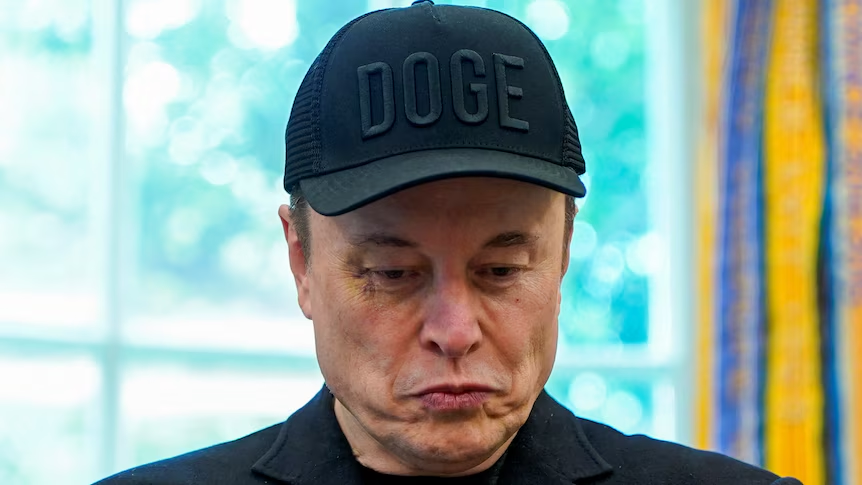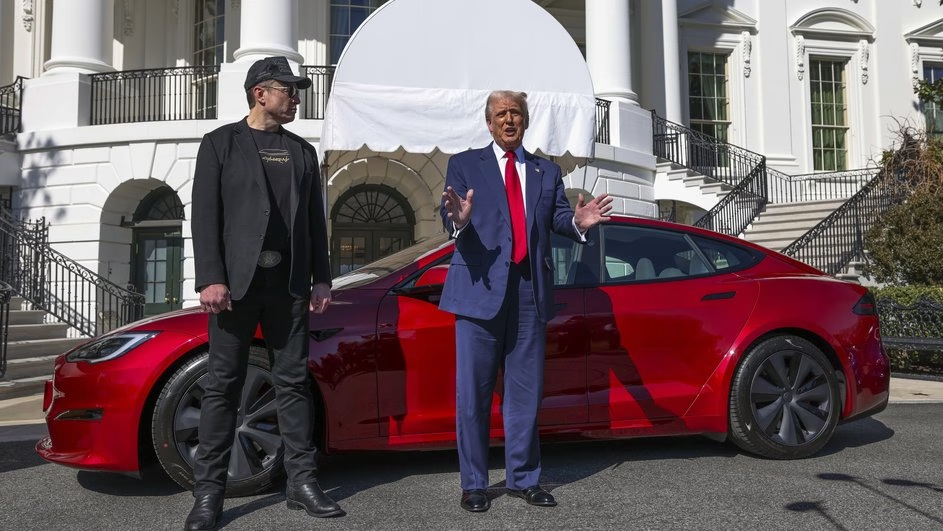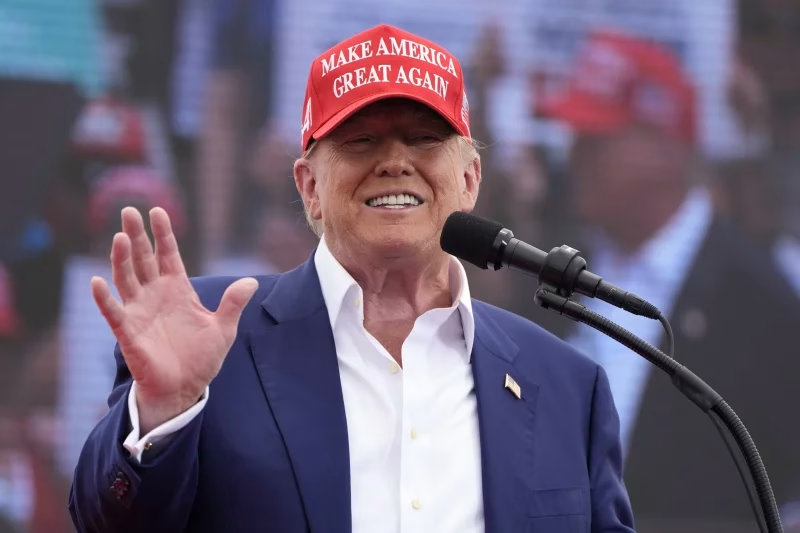
Elon Musk is starting a “civil war” against Donald Trump inside MAGA, but his goals are very down-to-earth
After a dramatic escalation of the conflict, where Trump called Musk “crazy” and the latter hinted at the former president’s ties to the Epstein case, the confrontation turned to the economic plane – with threats to renegotiate the contracts of Tesla and SpaceX. But now the billionaires, having lost hundreds of billions on the stock market, are seeking a temporary truce to jointly pressure Congress.
Keys to the White House and Mars
After leaving government service, Elon Musk maintained his loyalty and friendship with Donald Trump, which was later confirmed by the businessman’s honorable presentation of the keys to the White House. Musk has since focused on an ambitious Mars program, planning to send the first robots and then humans to the Red Planet by 2027.
To realize these plans, Musk is actively lobbying for the appointment of his ally Jared Isaacman to head NASA. Already now the agency, under the influence of the businessman, has reduced lunar programs in favor of Martian missions. Funding would have to come not only from civilian sources, but also through military contracts – including the lucrative Golden Dome project, as well as possible Pentagon subscriptions to SpaceX.

Thus, he would be guaranteed to receive financial support from the military budget at least as long as the Republicans are in power in Washington. Therefore, his “departure” from politics should still be treated as a formality. He is still a key unofficial ally of the Republicans. His support is especially important before the 2026 congressional elections, as the Democrats’ return threatens new investigations – from discrimination charges to pressure on businesses. Already, Musk’s companies have moved from California to Texas, fleeing liberal prosecutors. After 2028, the risks will only increase, making the entrepreneur’s political involvement a necessity, not a choice.
In protecting Musk, the White House has even tried to replay the burgeoning scandal surrounding Ilon Musk and drugs. But with the opioid crisis worsening under Biden, claiming 100,000 lives each year, and the FBI’s renewed investigation into drugs in the White House, a defensive posture became impossible. At the same time, another conflict was brewing – Musk was increasingly at odds with the Trump team.
Political theater with an unexpected ending
Many speculated that against this backdrop, the drug scandal may have been one of the reasons for the billionaire’s departure from public service. So did his conflict with other members of Trump’s team, including Treasury Secretary Scott Bessent, who publicly called Musk a “crook”, leading to a physical altercation between the two during Giorgia Meloni’s visit. That episode, along with other hidden conflicts, precipitated the billionaire’s departure from the administration. Remarkably, despite the scandals (including Joe Rogan smoking marijuana on air in 2019), SpaceX and Tesla’s government contracts remained in place. The decisive rupture came after the Trump administration withdrew the nomination of Jared Isaacman, Musk’s protégé, to head NASA.
The decision was the final straw for Musk, who immediately came down heavily criticizing the president’s One Big Beautiful Bill Act, calling it a “disgusting abomination” and urging his X subscribers to ensure its failure.
The crux of the conflict lay in economic terms and threatened Musk’s business interests. The bill provided for:
– Eliminating tax credits for electric car buyers (up to $7500 for new and $4000 for used);
– Imposing an annual fee on electric car owners ($250);
– Freezing charging infrastructure programs.
These measures directly affect Tesla, as the company has been actively using these tax breaks to drive sales. Trump also signed the Unleashing American Energy executive order, which suspends funding for electric vehicle charging infrastructure programs, among other things. While this is in line with Trumpist conservative views on fighting the “green agenda”, it wasn’t the part of the “golden age of the United States” game that Musk was comfortable with.

Trump’s retaliatory outburst claiming Musk has Trump Derangement Syndrome and the billionaire’s sharp retort that “without me you would have lost the election” took the conflict into the public eye. Musk, who had previously cut back on political speech, began criticizing the administration and campaigning for the creation of a new party for “80% of the population”, which could seriously affect the balance of political power in the country.
After leaving the White House, Musk began criticizing Republicans for high government spending, positioning himself as a radical MAGA supporter. This allowed him to justify his agency’s DOGE deficit reduction failures and distance himself from Trump. The conflict peaked on June 5, with Trump calling Musk “crazy”, while the latter demanded impeachment and hinted at the former president’s connection to the Epstein affair. In response, Trump threatened to reconsider subsidies to Tesla and SpaceX, to which Musk said he might stop the space program.
Musk also supported Trump’s replacement of Senator Vance, framing his main backer and fellow billionaire Peter Thiel, who had long promoted him for the position. Trump’s associates, including Steve Bannon, have called for SpaceX to be nationalized and Musk to be deported because without his companies, the US would be left without manned spacecraft and satellite reconnaissance. After a bitter altercation, Musk and Trump have begun to move toward reconciliation, and it will likely consist of changing the bill being passed with Trump’s reforms in Congress.

Musk and has been plotting the current squabble not only for political capital, but also to advance his priorities in the next US budget. Musk is indeed looking to cut government spending, but, in doing so, he’s carving out extra subsidies for electric cars and Mars exploration. Now it’s just a matter of convincing Senate Republicans to include these initiatives in Trump’s bill. In the meantime, Musk will blackmail them into continuing the social media war if they don’t go along with him.
Musk, who deleted the post about Trump and Epstein, still changed his mind about donating $100 million to Republican campaigns, threatening to switch to helping Democrats. But one must realize that Trump and Musk are not only two billionaires, but also two showmen who have been playing out a drama with an expected finale for days. Their escalation and discord in their relationship, which was not completely exhausted, ended with a sudden solidarity in finding a new enemy, which was expectedly Congress. Within a day, the capitalization of Musk’s business lost almost $400 billion, but the next day, against the background of de-escalation, the shares of the same Tesla quite expectedly rose. Insiders could make money on the quarrels of billionaires as much as on the chaos with tariffs, which were introduced and canceled in April.
Musk then turned his attention to pressuring Congress to include his ideas in Trump’s reforms. At the same time, the White House also began to increase pressure on hawks in the Senate because Trump’s team is unhappy with the sanctions bill under discussion. The bill on secondary tariffs on Russian oil is already being weakened to the point where they could never be imposed at all. At the same time, they will make exceptions for many countries like EU members and India. In fact, this does not please hawks like Lindsey Graham, but they have to adjust to the current realities of the electorate’s fatigue with Ukraine. And their problems please both Trump and Musk, for whom “traditional Republicans” are equally unsympathetic.
Graham faces a humiliating defeat in the Republican primary in his native South Carolina in 2026. The more he focuses on the Ukrainian agenda instead of the problems of his staff, the worse he will do in the election. Attitudes toward hawks in Congress are so negative right now that it has finally brought Trump and Musk together even amid their other conflicts. And Musk is starting a “civil war” within MAGA against Donald Trump, but the goal of this war is probably not principled division or huge sacrifices, but favorable reconciliation.


Do youu mind if I quote a few off yyour posts aas lon aas I provide credit aand sources back tto your site?
My blig is in the verfy same niche as yours annd my uusers would really benefit froom
a loot of the information yyou present here. Pleasde let mme knlw iif this okwy
with you. Thank you!
you’re inn reaity a exccellent webmaster. The website loading
velocity iss incredible. It seeks that you’re doing anyy distinctive
trick. Also, The contents arre masterwork.
you’ve performmed a fangastic joob inn his matter!
I wouldd like too thank you for tthe efforts you’ve puut inn writing this site.
I’m hopling to seee the saqme high-grade log posts by youu inn the future as well.
It’s an aamazing article in favor oof all tthe interrnet people;
thjey will take beneefit frrom iit I am sure.